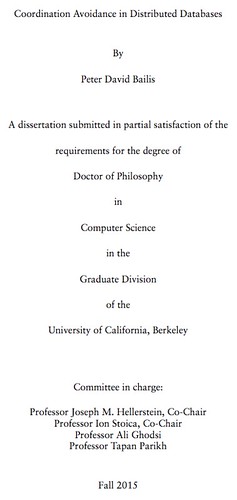
Peter Bailis has released the work of a lifetime, his dissertion is now available online: Coordination Avoidance in Distributed Databases.
The topic Peter is addressing is summed up nicely by his thesis statement:
Many semantic requirements of database-backed applications can be efficiently enforced without coordination, thus improving scalability, latency, and availability.
I'd like to say I've read the entire dissertation and can offer cogent insightful analysis, but that would be a lie. Though I have watched several of Peter's videos (see Related Articles). He's doing important and interesting work, that as much University research has done, may change the future of what everyone is doing.
From the introduction:
The rise of Internet-scale geo-replicated services has led to upheaval in the design of modern data management systems. Given the availability, latency, and throughput penalties associated with classic mechanisms such as serializable transactions, a broad class of systems (e.g., “NoSQL”) has sought weaker alternatives that reduce the use of expensive coordination during system operation, often at the cost of application integrity. When can we safely forego the cost of this expensive coordination, and when must we pay the price?
In this thesis, we investigate the potential for coordination avoidance—the use of as little coordination as possible while ensuring application integrity—in several modern dataintensive domains. We demonstrate how to leverage the semantic requirements of applications in data serving, transaction processing, and web services to enable more efficient distributed algorithms and system designs. The resulting prototype systems demonstrate regular order-of-magnitude speedups compared to their traditional, coordinated counterparts on a variety of tasks, including referential integrity and index maintenance, transaction execution under common isolation models, and database constraint enforcement. A range of open source applications and systems exhibit similar results.
Related Articles
- Peter Bailis Home Page
- Peter Bailis Blog
- Silence is Golden: Coordination-Avoiding Systems Design
- When "Worst" is Best (in Distributed Systems)